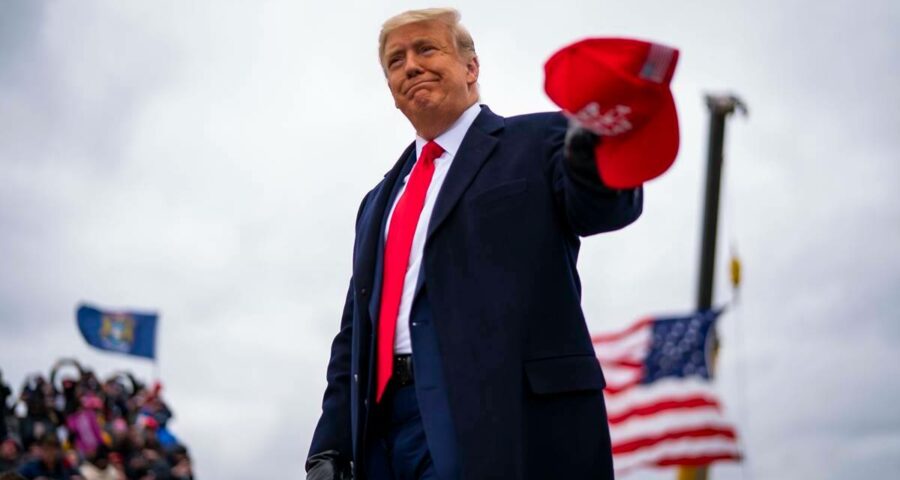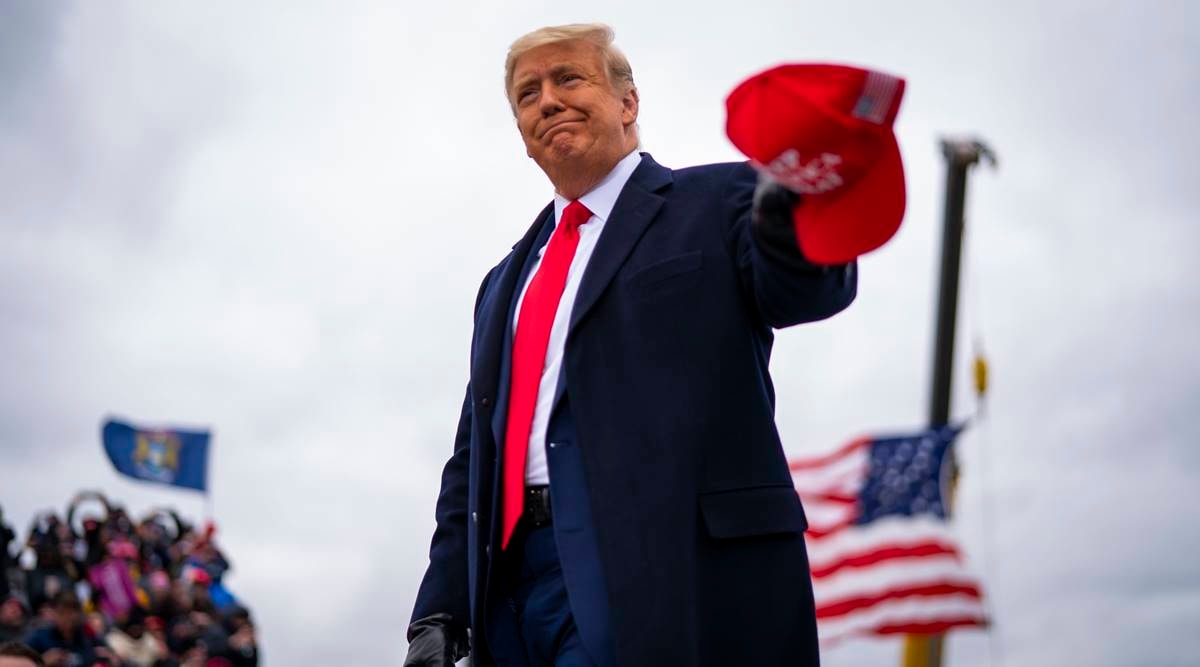Twitter is now strewn with the most unsettling moments from Trump’s last year in office. Vividly reported snapshots of a monumental year in American history are proliferating like cicada shells on city pavement.
Written by Katie Rogers
The capital was just beginning to quiet down for the summer when the buzz over the books began: Several seeking to explain the final year of Donald Trump’s presidency are landing so closely together over the next month that publishers have hastily changed publication days to avoid mid-scoop collisions.
It’s enough to give an author nightmares.
“I literally just wake up every day waiting to find out that someone else has jumped in front of us, and some book that I had no idea was coming is going to be announced,” Michael C. Bender, the author of “Frankly, We Did Win This Election: The Inside Story of How Trump Lost,” said in an interview.
Really, it is not the most unfounded fear. Bender is a reporter for The Wall Street Journal. “Frankly,” his first book, will be published on July 13. But he fast-tracked its publication, originally slated for August, after his publisher snooped on Amazon and uncovered the release dates of two other Trump-related books this summer: “Landslide: The Final Days of the Trump Presidency,” by Michael Wolff, and “I Alone Can Fix It: Donald J. Trump’s Catastrophic Final Year,” by Carol Leonnig and Philip Rucker, Pulitzer Prize-winning reporters at The Washington Post.
What has ensued is a war of excerpts among writers who are realizing their juiciest material may not hold. Twitter is now strewn with the most unsettling moments from Trump’s last year in office. Vividly reported snapshots of a monumental year in American history are proliferating like cicada shells on city pavement.
Bender’s book, in excerpts shared with CNN, Vanity Fair, Axios, The Daily Mail and others, lays bare the leadership failures of Trump and his team. “Frankly” is full of expletive-laden interactions, including one particularly colorful exchange between Gen. Mark Milley, the chairman of the Joint Chiefs of Staff, and Trump’s immigration adviser, Stephen Miller, over the protests that roiled the country last summer.
The drip-drip of material is the extreme version of a commonplace promotion strategy, intended to get Bender, a lesser-known writer than some of his competitors, maximum publicity. But others seeking to claim their territory are aggressively following suit: Jonathan Karl of ABC News, whose book does not come out until later this year, published his own excerpt in recent days in The Atlantic.
“It’s high pressure. Scoops, titles, where you are on Amazon,” said Matt Latimer, the literary agent at Javelin who negotiated the deal for Bender’s book and a murderers’ row of other political titles. “It’s like ‘The Godfather’: ‘This is the business we’ve chosen.’”
An excerpt from Michael Wolff’s “Landslide,” which will be published on July 27, is the cover story for New York magazine, and outlines a scene in which Trump told his chief of staff, Mark Meadows, that he “didn’t mean it literally” that his supporters should march to the Capitol on Jan. 6.
And more details of Trump’s illness from the coronavirus were shared before the publication on Tuesday of “Nightmare Scenario: Inside the Trump Administration’s Response to the Pandemic That Changed History,” by Damian Paletta and Yasmeen Abutaleb, journalists for The Post.
In their book, Paletta and Abutaleb present gripping evidence that Trump received a strong cocktail of drugs — “Trump’s doctors threw everything they could at the virus all at once,” they write. Robert R. Redfield, then the director of the Centers for Disease Control and Prevention, had prayed that a serious bout with the coronavirus would change Trump’s response to the pandemic. It did not.
“Nightmare Scenario” is focused on the federal government’s handling of the coronavirus — Abutaleb and Paletta do not examine the events of Jan. 6, for instance, and they did not interview Trump. Still, so many reporters covering the same material at the same time made for a crowded reporting process.
“We definitely would hear from sources that they had gotten calls from other reporters,” Paletta said in an interview. “That was quite intimidating for us.”
Some of the more decorated reporters in Washington’s press corps have chosen silence as a strategy as they complete books scheduled to publish this year.
Little is known about when Bob Woodward and Robert Costa of The Washington Post may publish their book on Trump’s final days, but the best guess from agents and authors alike is that it will be in September. (Neither author replied to requests for comment.)
The list of summer releases does not include titles coming next year from reporters for The New York Times. Peter Baker, the chief White House correspondent, is working on a definitive account of the Trump presidency with his wife, Susan Glasser of The New Yorker. Maggie Haberman, a former Trump White House reporter and current political correspondent for The Times, is also working on a book about Trump. Jonathan Martin and Alex Burns, national political correspondents, are writing a book on the presidential race between Trump and Joe Biden, and Jeremy Peters, who covers the Republican Party for The Times, is working on a book that assesses the GOP’s attempts to wrangle Trump.
Mark Leibovich, a political correspondent for The Times, is working on a sequel to “This Town,” a book on Washington culture, that will touch on the Trump era.
At the center of the publishing frenzy is the subject himself.
Aware of the barrage of books about his presidency and lacking a book deal that could give his grievances another formal platform, Trump has tried a charm offensive. He has invited some writers to Mar-a-Lago, his estate in Palm Beach, Florida, more than once, serving them steak and seating them in his estate’s great room, where the visiting journalists can be part of the political pageant that happens there each night.
Trump, who keenly understands his own place in the news media ecosystem, has turned down only a few interview requests, including one from Woodward. Woodward’s 2020 book, “Rage,” included several interviews with Trump, who told Woodward he had downplayed the threat of the coronavirus pandemic.
But Trump has quizzed other visiting journalists on the people they are talking to, the questions they are going to ask and the stories they plan to tell about his presidency.
“We were really surprised by how much time he spent talking to us,” Rucker said. “And by, frankly, how interested he was in our book and the subjects we were covering. He very much wanted to be a part of trying to shape the historical narrative of his presidency.”
(Given Trump’s history with reading books — he does not read them — Rucker does not expect that the former president will provide a full review.)
As Bender readied another excerpt for publication — this time detailing the long-running animosity that existed between Kellyanne Conway, Trump’s counselor, and his son-in-law, Jared Kushner — he said Tuesday evening that the breakneck pace with which he has written and promoted his book mirrored the hectic nature of four years on the Trump beat.
“When this is all done I want to ask my publisher how this is supposed to work,” Bender said. “Nothing about this has felt normal. Which is kind of the experience of covering Donald Trump in a nutshell.”
Source: Read Full Article


